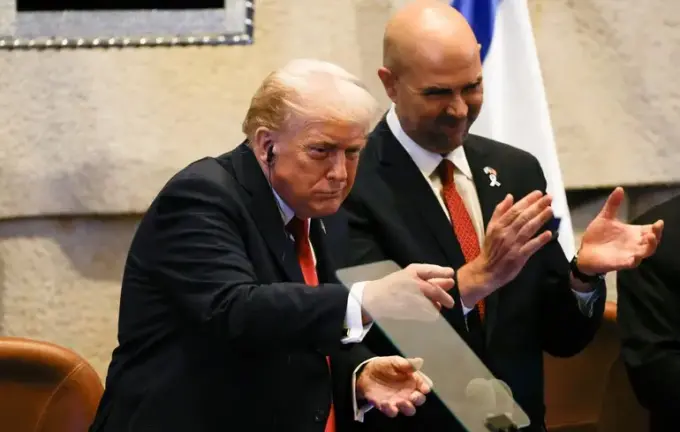Trump’s Unexpected Call to Pardon Netanyahu: Implications for Israeli Politics

On a historic day marked by the celebration of hostages’ release from Gaza and the conclusion of a two-year conflict in the Middle East, former U.S.
President Donald Trump made a surprising statement that stirred up the Israeli political landscape.
During his speech at the Knesset in Jerusalem, Trump unexpectedly addressed Israeli Prime Minister Isaac Herzog with a plea to pardon former Prime Minister Benjamin Netanyahu, who has been under investigation since 2019 on charges of corruption, bribery, and abuse of power.With a grin, Trump called for clemency, joking about Netanyahu’s achievements and describing him as “one of the most outstanding military leaders of our time.” This statement sparked enthusiastic applause and chants of ‘Bibi! Bibi!’ from Likud supporters and Netanyahu’s allies.
The speech vividly illustrated Trump’s readiness to intervene openly in the internal affairs of other countries—a provocative and controversial move, especially considering Netanyahu’s ongoing legal proceedings.Benjamin Netanyahu faces serious allegations, including accepting lavish gifts such as cigars, jewelry, and champagne from wealthy businessmen in exchange for political favors.
The investigation into these allegations, initiated in 2019, continues amid complex legal maneuvers and security concerns that have delayed proceedings.
Critics accuse Netanyahu of intentionally delaying the case, allegedly using the Gaza war to postpone judicial decisions, which complicates Israel’s political climate.Responses from former leaders and analysts were swift: Ehud Olmert, who himself was convicted of corruption, argued firmly that Netanyahu cannot be pardoned without accepting guilt—“pardon is only possible after acknowledgment of guilt, and Netanyahu will never do so.” Others stressed that any pardon without a clear admission of guilt violates constitutional norms and undermines the rule of law.Political experts and human rights advocates characterize Trump’s call as a “blatant violation of democratic principles,” emphasizing that foreign intervention in domestic judicial processes threatens the integrity of Israel’s democracy.
They insist that decisions regarding pardons should be made strictly within the bounds of national law, based on judicial findings, not external pressures.Overall, this incident underscores the tense political atmosphere in Israel and highlights the risks associated with foreign interference in internal affairs—an issue with broader implications for the region and international diplomacy.

